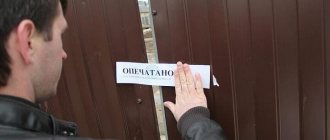How to find out information about the existence of a lien on an apartment
Every homeowner has the right to check whether there is a lien on his property. To do this, you can use two methods - checking online through the Rosreestr website and using an extract from the Unified State Register of Real Estate (hereinafter referred to as EGRN). Each method has both pros and cons. Let's consider both verification options.
Using the Rosreestr website
Checking the presence of an arrest through the Rosreestr website has a drawback - it is a partial or complete lack of information. If the extract from the Unified State Register contains the correct data, then the website will only indicate that restrictions have been imposed on the apartment. Restrictions can be different - seizure of real estate, for example, if the housing is pledged to a bank and so on.
If the property owner decides to check for restrictions in this way, then you will need to log in to the official Rosreestr page. Next you need to find the section “Reference information on real estate objects online”. After going to the section, the system will provide a small questionnaire that must be completely filled out.
After filling in all the fields, the system will check and display a list of found apartments. If the apartments were not found, it means that the property is not recorded in the Unified State Register of Real Estate. To view additional information, click on the found address.
In the additional information there will be a line “Restrictions”. If the property has no restrictions, the line will be empty. Unfortunately, information about an arrest may take several months to update. For example, restrictions were imposed on housing on June 6, 2018, but the data on the website was updated only on July 15, 2018.
Using the USRN extract
It is also possible to obtain an extract from the Unified State Register of Real Estate through the Rosreestr website. However, you will need to go through the entire queue (which can take up to three days). In order to avoid waiting, you can use the website whotam.pro. Extracts from such a site and through Rosreestr are no different. All necessary information is available. By the way, the state fee is the same - 250 rubles.
Obtaining an extract from the Unified State Register of Real Estate via the website ktotam.pro is quite simple, the main thing is to follow the instructions:
- You need to go to the site itself and write the address of the property;
- Select the found apartment and click on “Select object”;
- To receive an extract, simply check the box next to the appropriate service and proceed further;
- Next you need to enter your email address. It is to this mail that the USRN extract will be sent;
- To obtain information, you will need to pay a state fee. Its size is 250 rubles. Payment can be made either from a mobile phone balance or from a bank card;
- As soon as the payment is made, a letter with data from your personal account will be sent to your email. Using the data you need to log into your account;
- In your personal account, you will need to select the “My Statements” section and download the document.
By completing all 7 steps, you can receive the required document within one hour and see if there is a lien on the property.
Getting information online
When wondering how to find out whether an apartment has been seized, spending a minimum amount of time and without visiting any government agencies, it is worth noting that there are three options: send a letter, call the registration authority or use the Internet.
To find out whether there is a seizure on the apartment, you can go to the official portal of the territorial judicial authority (at the location of the property of interest) and see whether a court case has been registered against its owner. If no information is found, there is no arrest.
The next option for obtaining information of interest is the Rosreestr website, where you fill out an electronic form, pay the state fee and obtain an extract from a unified database. According to federal legislation, every citizen of the Russian Federation has such a right. In addition to information about encumbrances, the extract will contain information about the cadastral number of the property, its postal address, total area, and owner.
The deadline for providing information will depend on the region in which the apartment is located. The smaller the settlement, the faster. In this case, the amount of the state duty will not exceed one thousand rubles.
Who has the right to seize private property?
Only the court and the bailiff can seize real estate. Let's take a closer look at when the court can impose restrictions, and when the bailiff can.
Court
The court has the right to seize real estate if the homeowner plans to quickly sell the home before the start of the trial. If the court has received a petition to take measures to secure the claim, the consideration of the complaint occurs on the day it is filed. Thanks to this, the owner will not be able to sell the property, which means that a trial will be scheduled.
In accordance with Part 2 of Article 139 of the Code of Civil Procedure of the Russian Federation, securing a claim is allowed in any state of the case if failure to take measures to secure the claim may complicate or make it impossible to enforce the court decision.
Evgeniy Baidalin
Practicing lawyer in civil and arbitration cases. More than 8 years of experience
Ask a Question
Therefore, I recommend that evidence of the alienation of the disputed property be attached to the application for interim measures. For example, you can attach a copy of a screenshot of a page from the Avito website, on which the debtor (defendant) put his car up for sale.
Bailiff
A bailiff can impose an arrest in two cases:
1. Thanks to the writ of execution on taking measures to secure the claim, issued by the court. When the documents arrive at the FSSP, the bailiff immediately receives the information. He is obliged to either initiate or refuse to initiate proceedings. The arrest procedure takes place within 24 hours;
To more quickly take interim measures, the court can send a writ of execution to the bailiff service independently or through the applicant.
2. Thanks to the case within the framework of enforcement proceedings. If a bailiff is investigating a case in which a citizen maliciously fails to pay alimony, debts, fines, etc., then he can seize the property. This procedure occurs in order to force the debtor to pay. Most people are afraid of bailiffs, because if they cannot pay all the debts, they may simply lose their property.
Bailiffs can seize the debtor’s only home for large debts, but they have no right to put it up for auction for sale (except for mortgaged housing). This will violate Article 25 of the Constitution of the Russian Federation: “Housing is inviolable. No one has the right to enter a home against the will of the persons living there, except in cases established by federal law, or on the basis of a court decision.
Is it possible to appeal the seizure of property?
In some cases, the court seizes the property of the defendant, as part of a civil process, not always taking into account the interests of the owner of this property, thereby limiting not only the alienation, but also the possibility of using such property. If a court seizure of an apartment has no visible consequences for the defendant, unless he intended to sell it before the court’s decision, then issuing a ruling to seize a car, prohibiting its use, can significantly complicate the defendant’s life, especially if the vehicle is used for work.
A situation where a court seizes a company’s bank account can lead to even more negative consequences. This makes it impossible not only to carry out business activities, but also to pay salaries to employees.
To challenge a court ruling to seize property or a bank account, you must write an application addressed to the judge who is handling your case in a civil or criminal proceeding. The complaint is written in free form, in compliance with the usual procedure for filing applications to government agencies. In addition to the details and personal data of the author of the application, the text of the complaint must contain the following information:
- A statement of circumstances that indicate a violation of the established procedure for arrest, inventory or storage of property.
- An indication of the reasons why the seizure of property or a bank account cannot be an interim measure under the claim.
- Position and full name bailiff who committed a violation during the inventory or seizure of property.
- Requirements for the court: cancellation of the order to seize property or bank account, appeal against the actions (inaction) of the bailiff, cancellation or change of the order of enforcement proceedings
- The apartment cannot be sold or mortgaged
- Tenants are not allowed into the apartment
- The apartment cannot be given or exchanged
- The apartment cannot even be bequeathed
The Law “On State Registration of Rights to Real Estate and Transactions with It” establishes the obligation to notify the registration authorities within three days of the arrest of an apartment by court decision (Article 28).
The difference between arrest and prohibition
- The apartment is seized by a court decision.
- A ban is an interim measure that is imposed by the prosecutor's office or the police.
Why is the apartment seized?
In the vast majority of cases, an apartment is seized due to the debts of the owner or co-owner of the apartment. Most often these are debts to banks, debts to other legal entities or citizens, or tax debts.
In addition, the apartment is seized due to property litigation - a claim for compensation for damage, and property, the seizure precedes acts of confiscation of property.
Most often it happens like this: the mortgage borrower experiences interruptions in payments (lost his job). He runs to the bank, negotiates an installment plan, a “mortgage holiday,” or some kind of moratorium until he finds a new job. The bank most often makes reasonable concessions, however, just in case, it seizes the apartment.
The bank itself or any other creditor does not have the right to seize the apartment; to do this, it goes to court with a claim to seize the apartment pledged under the agreement. In order for the court to seize an apartment, grounds are needed, for example, the relative amount of the debt.
For example, if it determines that the remaining amount of debt to the bank is small enough, it may refuse to seize the apartment.
How to find out if an apartment is under arrest
Most often this question arises when selling an apartment. This is a very important issue and fraudsters can take advantage of such narrow moments - for example, by selling an apartment that is under arrest by writing a power of attorney for its sale with a notary.
To find out about the arrest of an apartment, you need to request a Unified State Register certificate from the owner of the property. Particular attention should be paid to the date of this document; it is quite possible that the arrest of the apartment was carried out after the issuance of this document.
In order to lift a seizure from an apartment, you need to find out who imposed the seizure and for what reason. For example, if there were delays on the mortgage, then the seizure is lifted immediately after the resumption of payments; these conditions are negotiated by the bank when filing a claim to seize the apartment.
The arrest due to tax debts is also lifted; the arrest is lifted immediately after all amounts have been paid - the amount of the debt, all fines and penalties.
The seizure of the apartment is lifted by the same body that imposed it - by the bailiff after the fulfillment of obligations, by the court (Article 141 of the Code of Civil Procedure of the Russian Federation) if the grounds for the seizure of the apartment have disappeared - for example, property is divided, debts are paid, damage is compensated.
What cannot be claimed
- Residential premises or parts thereof, if for the debtor it is the only one suitable for habitation
- An exception to this rule is a mortgaged apartment pledged to the bank in accordance with the law
How to find out who seized property?
To obtain information about who exactly seized the property, you can use an extract from the Unified State Register or contact the bailiffs at the debtor’s location. The EGRN extract itself will contain all the necessary information - what kind of restriction is assigned, the period for installing the encumbrance and who carried out the arrest. But it is also possible to personally visit the FSSP branch.
Obtaining information about an arrest at the FSSP office
A personal visit to the bailiff department is good because the debtor can immediately talk and try to agree with the bailiff on what needs to be done to lift the arrest. However, in order for the bailiff to provide assistance, you will need to provide a passport of a citizen of the Russian Federation and all basic information about the arrested object.
Bailiffs of Izhevsk and Udmurtia (department, address, website, telephone)
| Department name | Address | Website | Telephone |
| Interdistrict Department for Execution of Special Enforcement Proceedings | 426063, Izhevsk, st. Vorovskogo, 108 | [email protected] | (3412) 27-13-38 |
| Ustinovsky ROSP of Izhevsk | 426073, Izhevsk, st. Soyuznaya, 75 | [email protected] | (3412) 27-13-45 |
| Industrial ROSP of Izhevsk | 426050, Izhevsk, st. January 9th, 263 | [email protected] | (3412) 27-13-41 |
| Leninsky ROSP of Izhevsk | 426028, Izhevsk, st. Gagarina, 23 | [email protected] | (3412) 27-13-32 |
| Oktyabrsky ROSP of Izhevsk | 426033, Izhevsk, st. 50 years of Pioneerhood, 30 | [email protected] | (3412) 27-13-35 |
| Pervomaisky ROSP of Izhevsk | 426063, Izhevsk, st. Tsiolkovsky, 17 | [email protected] | (3412) 27-13-39 |
| Alnashsky ROSP | 427880, p. Alnashi, st. Komsomolskaya, 12 | [email protected] | (3412) 27-12-97 |
| OSP for Balezinsky and Kezsky districts | 427550, Balezino village, st. K. Marksa, 1a | [email protected] | (3412) 27-12-03 |
| Vavozhsky ROSP | 427310, p. Vavozh, st. International, 55 | [email protected] | (3412) 27-12-94 |
| Votkinsk ROSP | 427430, Votkinsk, 1st May st., 101 | [email protected] | (3412) 57-03-32 |
| Grakhovsky ROSP | 427730, p. Grahovo, st. Kolpakova, 18 | [email protected] | (3412) 27-12-85 |
| OSP for Glazovsky and Yarsky districts | 427730, Glazov, st. Glazovskaya, 53 | [email protected] | (3412) 27-12-79 |
| Debessky ROSP | 427060, p. Debesy, st. Sovetskaya, 98 | [email protected] | (3412) 27-12-75 |
| Zavyalovsky ROSP | 427000, p. Zavyalovo, st. Chkalova, 38 | [email protected] | (3412) 27-12-87 |
| Igrinsky ROSP | 427145, p. Igra, st. Sovetskaya, 27 | [email protected] | (3412) 27-19-53 |
| Kambarsky ROSP | 427950, Kambarka, K. Marx St., 78-2 | [email protected] | (3412) 27-12-96 |
| Kiznersky ROSP | 427710, Kizner village, st. Kiznerskaya, 101 "a" | [email protected] | (3412) 27-12-02 |
| Kiyasovsky ROSP | 427840, p. Kiyasovo, st. Gorky, 2 a | [email protected] | (3412) 27-12-89 |
| Krasnogorsk MROSP | 427650, p. Krasnogorskoe, st. Lenina, 64 | [email protected] | (3412) 27-12-68 |
| Mozhginsky ROSP | 427790, Mozhga, st. Falaleeva 8 | [email protected] | (3412) 27-12-67 |
| Malopurginsky ROSP | 427820, p. Malaya Purga, st. Pionerskaya, 43 | [email protected] | (3412) 27-12-78 |
| Department of Bailiffs in Sarapul | 427960, Sarapul, st. Sovetskaya, 1 | [email protected] | (3412) 27-12-84 |
| Department of bailiffs for Sarapul and Karakulinsky districts | 427960, Sarapul, st. Gogol, 58 b | [email protected] | (3412) 27-12-98 |
| Seltinsky ROSP | 427270, p. Selty, st. Mira, 7-15 | [email protected] | (3412) 27-12-74 |
| Uva MROSP | 427260, Uva village, st. Kalinina, 23 | [email protected] | (3412) 27-12-05 |
| Sharkansky ROSP | 427070, p. Sharkan, st. Sovetskaya, 34 | [email protected] | (3412) 27-12-95 |
| Yakshur-Bodinsky ROSP | 427100, p. Yakshur-Bodya, st. Lenina 28/3 | [email protected] | (3412) 27-12-86 |
How to find out about the arrest of an apartment or other property
A court order to seize a car, apartment, bank account or other property can not only protect the interests of the author of the claim, but significantly complicate the life of the defendant - especially when the court ruling is not equivalent to the amount of the material claims put forward. For example, a claim filed in a civil proceeding requires compensation of 20 thousand rubles for damage caused, while in order to ensure this, a car worth 1 million rubles was seized. In this case, the court decision is illegal and subject to challenge.
Do not forget that the presence of a court ruling on the seizure of a car or other property is sometimes extremely important for third parties - especially when they are going to purchase the property of the defendant in a civil or criminal case, without knowing that it has been seized. In addition, the seizure of a bank account can actually paralyze the activities of an entire enterprise, where dozens or even hundreds of employees work.
To check whether an apartment or any other real estate, including land plots, has been seized, you should take an extract from the Unified State Register. Any adult citizen can submit an application for such an extract to Rosreestr. The cost of the statement is 200 rubles.
Finding out whether a car has been seized by a court is even easier than obtaining a certificate about the legal status of an apartment. To do this, just go to the official website of the traffic police and use a special online service for checking vehicle restrictions. The check is carried out using the vehicle number.
In addition, the law allows third parties to receive information about the seizure of the bank account of an individual or legal entity they are interested in.
This feature is very useful if a citizen or organization is going to enter into a major transaction with this person - obtaining information about the account eliminates possible problems when transferring money. You can find out whether a bank account has been seized or not by using the online service of the Federal Bailiff Service. By entering your full name into the form of the Data Bank of Enforcement Proceedings. and the address of the citizen you are interested in, you will almost instantly find out that he has a seized bank account in a civil suit or criminal case.
In what cases is an encumbrance placed on private property?
A citizen of the Russian Federation who owns real estate may have the apartment seized. This happens if there are debts for large sums of money. It is important to note that a bailiff can seize real estate for the purpose of selling it only if the amount of debt is significant. Let's look at several cases in which restrictions may be imposed.
For non-payment of alimony
If a citizen does not pay alimony for a long time, then the other party has the right to turn to bailiffs. It is important to understand that a document confirmed by the court is required that the citizen must pay alimony.
Thus, a bailiff can seize property if it is not the only residence. In addition to apartment restrictions, seizures may be issued on a vehicle, luxury items, and so on.
For housing and communal services debts
For non-payment of utilities, real estate may sometimes be seized, but such a procedure occurs extremely rarely. The amount must be significant, otherwise the bailiff does not have the right to impose an encumbrance.
So, the debt must be greater than the value of the property. If this condition is met, the bailiff may seize the property and subsequently sell the apartment.
For other debts of the owner
Often, banking organizations turn to bailiffs to seize the debtor’s property. This happens if a citizen cannot or refuses to pay for a mortgage and consumer loan.
In addition to the arrest itself, the bank may require the transfer of the apartment or its sale at auction. Although the property is owned by the debtor, it was purchased with the help of a mortgage. If trading takes place, the money received will go to the banking organization. But sometimes the amount received is not enough, so the debtor still owes the bank.
An arrest can also be issued if a citizen causes harm to the health or property of another person. This often happens when one neighbor floods another, and the amount of damage is significant. But it is important to understand that an arrest can be issued if the culprit is trying to specifically sell the apartment before the start of the trial.
When can an arrest not be imposed?
In some cases, bailiffs do not have the right to place a lien on real estate. So, if the debtor has only one home (real estate), then it cannot be under arrest. However, in some cases, restrictions are applied to induce payment rather than to sell the property.
Evgeniy Baidalin
Practicing lawyer in civil and arbitration cases. More than 8 years of experience
Ask a Question
It is impossible to place a lien on housing if the amount of debt is insignificant in relation to the value of the property. So, for example, if the total debt for utilities reaches 20,000 rubles, then the court will refuse to seize the property.
Conditions for removing the encumbrance
In order for all restrictions to be lifted from real estate, a document confirming the fulfillment of all obligations of the debtor is required. Such a document indicates that the citizen has paid all debts and the other party has no claims.
In addition to the main document, you will need a number of other documents (passport, debt repayment, mortgage). You can submit them to the MFC, where the procedure for removing the encumbrance will take place.
After submitting the documents, you will need to wait approximately 30 days. After the expiration of the period, the owner will be issued a new title deed. But you will need to pay a state fee of 350 rubles. Additional costs may apply, depending on the intermediary bank.
If a citizen has a lien on real estate, then it is best to pay all debts, otherwise bailiffs may sell the property at auction. There are many nuances of arrest and those moments when restrictions cannot be imposed.
So, if the debtor has only one apartment, then it cannot be sold at auction.








